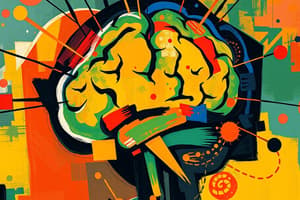Podcast
Questions and Answers
Which of these concepts is essential for understanding the psychological process of adapting to change?
Which of these concepts is essential for understanding the psychological process of adapting to change?
What type of transition would an unexpected job loss be considered?
What type of transition would an unexpected job loss be considered?
Which of the following is NOT a characteristic of a transition, according to Schlossberg?
Which of the following is NOT a characteristic of a transition, according to Schlossberg?
What does the WHO definition of Quality of Life (QOL) emphasize about an individual's perception of their position in life?
What does the WHO definition of Quality of Life (QOL) emphasize about an individual's perception of their position in life?
Signup and view all the answers
Which of the following is NOT a key component of the adjustment process, as outlined in the lecture guide?
Which of the following is NOT a key component of the adjustment process, as outlined in the lecture guide?
Signup and view all the answers
What is the primary purpose of keeping a journal in relation to the PSY3130 course?
What is the primary purpose of keeping a journal in relation to the PSY3130 course?
Signup and view all the answers
What is the significance of Dai Williams' model in the context of the course?
What is the significance of Dai Williams' model in the context of the course?
Signup and view all the answers
Which of the following is NOT a key component of 'the self' in adjustment?
Which of the following is NOT a key component of 'the self' in adjustment?
Signup and view all the answers
Why is the study of transitions important in the context of adjustment?
Why is the study of transitions important in the context of adjustment?
Signup and view all the answers
Which of the following statements accurately reflects the difference between change and transition?
Which of the following statements accurately reflects the difference between change and transition?
Signup and view all the answers
Which of the WHOQOL domains includes facets related to personal relationships, social support, and activities as a provider/supporter?
Which of the WHOQOL domains includes facets related to personal relationships, social support, and activities as a provider/supporter?
Signup and view all the answers
Which facet within the "Environment" domain assesses an individual's satisfaction with their current job?
Which facet within the "Environment" domain assesses an individual's satisfaction with their current job?
Signup and view all the answers
Which of the following is NOT a factor that influences an individual's perception of quality of life, as discussed in the text?
Which of the following is NOT a factor that influences an individual's perception of quality of life, as discussed in the text?
Signup and view all the answers
Which WHOQOL domain can be directly impacted by facets like "pain and discomfort" and "energy and fatigue"?
Which WHOQOL domain can be directly impacted by facets like "pain and discomfort" and "energy and fatigue"?
Signup and view all the answers
Which of the following is a significant factor contributing to the difficulty in measuring quality of life?
Which of the following is a significant factor contributing to the difficulty in measuring quality of life?
Signup and view all the answers
Which facet within the "Level of Independence" domain specifically focuses on the ability to engage in daily activities?
Which facet within the "Level of Independence" domain specifically focuses on the ability to engage in daily activities?
Signup and view all the answers
Which of the following is a potential consequence for individuals who struggle to adjust successfully to life challenges?
Which of the following is a potential consequence for individuals who struggle to adjust successfully to life challenges?
Signup and view all the answers
Which of the following facets is NOT directly related to an individual's physical health and well-being, as outlined in the WHOQOL domains?
Which of the following facets is NOT directly related to an individual's physical health and well-being, as outlined in the WHOQOL domains?
Signup and view all the answers
Which WHOQOL domain encompasses subjective experiences related to emotions, thinking, memory, and self-esteem?
Which WHOQOL domain encompasses subjective experiences related to emotions, thinking, memory, and self-esteem?
Signup and view all the answers
Which of the following is NOT a facet within the WHOQOL "Environment" domain?
Which of the following is NOT a facet within the WHOQOL "Environment" domain?
Signup and view all the answers
Study Notes
Course Information
- Course title: Psychology of Adjustment (PSY3130)
- Textbook: Human Adjustment (2nd edition) by Jane S. Halonen and John W. Santrock
- Assessment: A "wise flow" exam with two parts
- Part 1: 25 multiple-choice questions (50% of the mark)
- Part 2: 1 essay question (500-750 words) (50% of the mark)
Lecture Guide Topics
- Nature of Adjustment
- Adjustment across the lifespan
- The adjustment process and transitions
- Stress and coping
- The Self in adjustment
- Social thinking, emotional intelligence, and subjective well-being
- Applications to gender and sexuality, careers and work
- Love, intimacy, relationships, and attachment
- Adjustment and physical and mental health
Building Up to the Essay Question
- Start a journal
- Identify a transition to discuss (Schlossberg, 1984)
- Map the transition using Dai Williams' (1999) model (covered in lecture 2)
- Take notes and explain the transition and its impact, using concepts learned in lectures
Key Definitions
- Change: A shift in a situation; something has altered.
- Transition: The internal psychological process of reorientation in response to change. It involves the stages of "before," "during," and "after" the change.
- Transition (Schlossberg, 1984): Any event or non-event that leads to changes in relationships, routines, assumptions, roles, and identity.
Types of Transitions
- Anticipated: Predictable transitions (e.g., marriage, graduation, birth of a child).
- Unanticipated: Unexpected transitions (e.g., getting fired, sudden death of a loved one).
- Non-events: Transitions that are expected but do not occur (e.g., a planned marriage that doesn't happen, a missed promotion).
Quality of Life (QOL)
- Definition (WHO): An individual's personal perception of their life position within their culture's value system, regarding their goals, expectations, standards, and concerns.
- Factors influencing QOL: Circumstances, age, life transitions, personality, stress and coping, health conditions, and finances.
- Readjustment: Individuals continuously re-evaluate and adapt their definitions of QOL in response to changing circumstances.
WHO-QOL Assessment Domains and Facets
-
Domain I (Physical):
- Pain and discomfort
- Energy and fatigue
- Sexual activity
- Sleep and rest
-
Domain II (Psychological):
- Emotions
- Thinking, learning, memory, and concentration
- Self-esteem
- Bodily image and appearance
-
Domain III (Level of Independence):
- Mobility
- Activities of daily living
- Dependence on medicinal substances and medical aids
- Dependence on non-medicinal substances (alcohol, tobacco, drugs)
- Communication capacity
- Work capacity
-
Domain IV (Social Relationships):
- Personal relationships
- Social support
- Activities as a provider/supporter
-
Domain V (Environment):
- Freedom, physical safety, and security
- Home environment
- Work satisfaction
- Financial resources
- Health and social care accessibility
- Recreation, leisure, and participation opportunities
- Physical environment (pollution, noise, traffic, climate)
- Domain VI (Spirituality): Spirituality/religion/personal beliefs as they relate to coping and resilience.
Importance of Adjustment
- Successful adjustment is essential for a high quality of life.
- Those unable to adapt may experience anxiety, depression, hopelessness, anhedonia, concentration difficulties, sleep problems, and reckless behavior.
Studying That Suits You
Use AI to generate personalized quizzes and flashcards to suit your learning preferences.
Related Documents
Description
Test your knowledge on the key concepts from the Psychology of Adjustment course. This quiz covers essential topics such as stress and coping, relationships, and the adjustment process across the lifespan. Prepare effectively for your wise flow exam!




